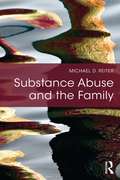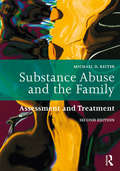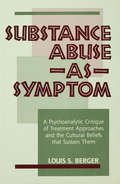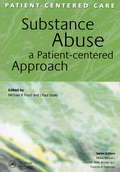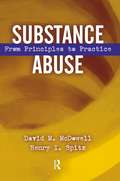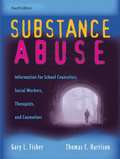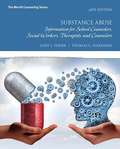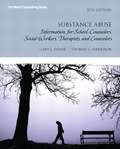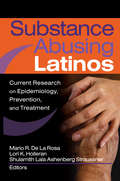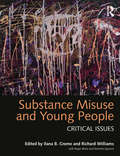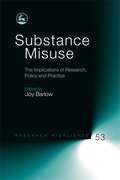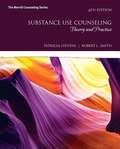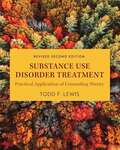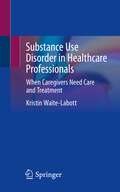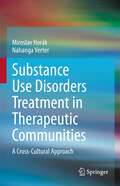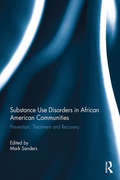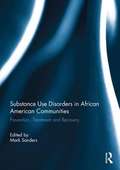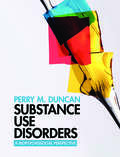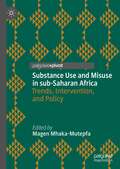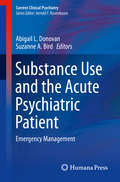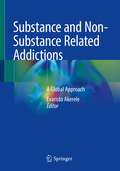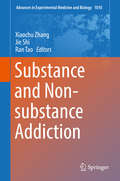- Table View
- List View
Substance Abuse and the Family
by Michael D. ReiterSubstance Abuse and the Family demonstrates what it means to view addiction through a systems lens by considering biology and genetics, family relationships, and larger systems. Throughout the text, Michael D. Reiter shows how to examine a person's predilection to become addicted, his or her social environment around substance use, the functionality of his or her family, and various treatment options. Chapters are organized around two sections: Assessment and Treatment. The first section pays attention to how the family system organizes around substance use and abuse. Here family roles, culture, and other issues such as family violence and resilience are covered. Two chapters are also included on the neuroscience and genetics of addiction, with contributions from Jaime L. Tartar and Christina Gobin. There are also chapters on working with partial systems, using genograms, and working in a culturally-sensitive way (with contributions from Dalis Arismendi), with culture-specific consideration paid to African American, Hispanic and Latin American, Asian American, and Native American families. The second half of the book explores what a systems orientation means in practice and goes over self-help groups for individuals and families. An overview of the major family therapy theories is included, which examines intergenerational, experiential, communication approaches, strategic, systemic, and post-modern models. A separate chapter examines issues faced by both youth and adult children of alcoholics. Intended for undergraduate and graduate students, as well as beginning practitioners, this text is one of the most penetrating and in-depth examinations on the topic available. .
Substance Abuse and the Family: Assessment and Treatment
by Michael D. ReiterIn this updated edition of Substance Abuse and the Family, Michael D. Reiter examines addiction through a family systems lens which considers a range of interconnected contexts, such as biology and genetics, family relationships, and larger systems. Chapters are organized around two sections: Assessment and Treatment. Examining how the family system organizes around substance use and abuse, the first section includes contributions on the neurobiology and genetics of addiction, as well as chapters on family diversity, issues in substance-using families, and working in a culturally sensitive way. The second half of the book explores various treatment options for individuals and families presenting with substance abuse issues, providing an overview of the major family therapy theories, and chapters on self-help groups and the process of family recovery. The second edition has many useful additions including a revision of the family diversity chapter to consider sexual and gender minorities, brand new chapters on behavioral addictions such as sex and gambling, and a chapter on ethical implications in substance abuse work with families. Additional sections include information on Multisystemic Therapy, Behavioral Couples Therapy, Motivational Interviewing, and Twelve-Step Facilitation. Each chapter now contains a case application to help demonstrate treatment strategies in practice. Intended for undergraduate and graduate students, as well as beginning practitioners, Substance Abuse and the Family, 2nd Ed. remains one of the most penetrating and in-depth examinations on the topic available.
Substance Abuse as Symptom: A Psychoanalytic Critique of Treatment Approaches and the Cultural Beliefs That Sustain Them
by Louis S. BergerWhat can psychoanalysis contribute to an understanding of the etiology, treatment, and prevention of substance abuse? Here, Louis Berger contests both the orthodox view of substance abuse as a "disease" explicable within the medical model, and the fashionable dissenting view that substance abuse is a habit controllable through the "willpower" fostered by superficial treatment approaches. According to Berger, substance abuse is first and foremost a symptom. He argues that it is only by grasping this fact that we can understand why standard approaches to treatment and prevention have failed. Berger invokes a wide spectrum of recent analytic insights about infant and child development, the psychology of narcissism, and primitive character disorders in making the case that substance abuse masks serious preoedipal (or "midrange") psychopathology. Such psychopathology, operating at both cultural and person levels, explains why certain individuals become dependent on illicit drugs; it is equally revelatory of why the substance abuse "establishment" -- and society at large -- continues to misconstrue the nature of the problem and to proffer ill-conceived and ineffective remedies. After thoroughly examining the motives, conscious and unconscious, that maintain "mainstream" myths about substance abuse, Berger points the way to alternative approaches to prevention and treatment.
Substance Abuse: A Patient-Centered Approach
by Michael Floyd J Paul SealeSeries Editors: Moira Stewart, Judith Belle Brown and Thomas R Freeman Primary care clinicians are often unfamiliar with new and effective methods for detecting substance abuse problems in their earliest stages, and the majority of patients with substance abuse problems remain undiagnosed. Substance Abuse is written by primary care clinicians and focused to meet the needs of primary care providers, demonstrating how the patient-centered clinical method can assist clinicians in learning how to diagnose this complex psychosocial disorder. This book describes how to use state-of-the-art screening techniques, and how to understand and motivate patients to decrease or eliminate harmful use of alcohol and drugs. It presents the latest scientific findings and gives examples of using a patient-centered approach, as well as describing specific communication skills, with samples of dialogue illustrating their use in helping substance-abusing patients. This is essential reading for all family doctors, paediatricians, gynaecologists, psychiatrists, nurses, social workers, psychologists and all clinicians whose practices include substance abusing patients. It will also appeal to counsellors, education personnel and all professionals working with substance abusing individuals.
Substance Abuse: From Princeples to Practice
by Henry I. Spitz David McDowellDesigned as a 'one-stop shopping' tool for anyone interested in or affected by substance abuse, this book provides detailed discussions that include the history, chemistry, biology, epidemiology, and salient characteristics of the most important and prevalent abused substances.
Substance Abuse: Information for School Counselors, Social Workers, Therapists, and Counselors (4th edition)
by Gary L. Fisher Thomas C. HarrisonWeaving actual clinical examples with solid research, Substance Abuse continues to provide counseling, social work, and other students with a detailed overview of the alcohol and other drug (AOD) field. Now in its Third Edition, this text provides updated coverage and practical clinical examples to reflect the rapid changes in the field of addiction. In a reader-friendly style, the authors present balanced coverage of various treatment models as well as objective discussions of the controversies in the field. The text covers topics spanning the entire field--pharmacology, assessment and diagnosis, treatment, recovery, prevention, children, families, and other addictions--providing students with a broad view of the AOD field as well as the pervasiveness of the problem in all areas of behavioral health and general fields.
Substance Abuse: Information for School Counselors, Social Workers, Therapists, and Counselors (Sixth Edition)
by Gary L. Fisher Thomas C. Harrison<p>In an accessible writing style, Fisher and Harrison’s Substance Abuse: Information for School Counselors, Social Workers, Therapists and Counselors presents succinct, practical coverage of alcohol and other drug prevention, treatment, and recovery for generalist students, prospective mental health professionals, and allied professionals. It includes basic information on substances of abuse and focuses on clinically relevant knowledge on such topics as cultural competence, co-occurring disorders, other behavioral addictions, children and families, and ethics and confidentiality. <p>Each chapter includes clinical application cases and questions for further discussion. The new edition inclues a new chapter on “Co-Occurring Disorders and Other Special Populations,” new information on cultural competencies and intervening with special populations such as the elderly and LGBTQQI, and new information on risk factors for alcohol and other drugs for culturally and ethnically diverse populations. </p>
Substance Abuse: Information for School Counselors, Social Workers, Therapists, and Counselors,
by Thomas C. Harrison; Gary L. FisherIt combines the accessible writing style and succinct, practical topical coverage that have made it a market-leading resource for generalist students, prospective mental health professionals, and allied professionals.
Substance Abusing Latinos: Current Research on Epidemiology, Prevention, and Treatment
by Shulamith L Straussner Mario De La Rosa Lori HolleranDiscover the role culture, family, and environment have in the prevention of Latino substance abuseInformation about the substance abuse behaviors among Latino populations has been limited. Substance Abusing Latinos: Current Research on Epidemiology, Prevention, and Treatment fills this void by presenting the latest research on the epidemic of substance abuse now afflicting the Latino community. Ethnic differences are reviewed, including specific studies covering gang members, low-income urban women, risky behaviors, and language preference indicators of acculturation. This book does more than simply present the research-it discusses effective treatment strategies to help practitioners provide quality, culturally competent care to lacking Latino populations. Latinos, the largest minority in the United States, have an increasing alcohol and illicit drug use problem. Culture, acculturation, and language hold powerful sway in the research of Latino/a substance abuse. Substance Abusing Latinos: Current Research on Epidemiology, Prevention, and Treatment delves deeply into troubling issues such as gang membership, sexual abuse, the lack of healthy family role models, the effects of different levels of acculturation, the lack of health insurance, and rampant involvement with the criminal system. The research is used as a foundation to focus on the latest advances of substance abuse prevention and culturally competent intervention programs.Each chapter is extensively referenced to reinforce research.Substance Abusing Latinos: Current Research on Epidemiology, Prevention, and Treatment explores: substance abuse among gang members in a small city childhood sexual abuse and drug use among low-income Puerto Rican women a comparison of risky behaviors of African-American and Cuban-American adolescent juvenile offenders acculturation status and substance use prevention with Mexican and Mexican-American youth culturally competent intervention with families of Latino youth at risk for drug abuse psychiatric, family, and ethnicity-related factors that can impact treatment among Hispanic substance abusing adolescents HIV/AIDS prevention practice with substance abusersSubstance Abusing Latinos: Current Research on Epidemiology, Prevention, and Treatment is essential reading for educators, students, practitioners working with Latino/a populations, and substance abuse researchers.
Substance Dependence and Co-Occurring Psychiatric Disorders: Best Practice for Diagnosis and Clinical Treatment
by Edward V. Nunes Jeffrey Selzer Petros Levounis Carrie A. DaviesNow in one authoritative source: What everyone who treats substance abuse must know about co- occurring psychiatric disorders... This master reference, developed by a team of nationally known and respected researchers, clinicians, and program directors, is the first comprehensive handbook that provides a full treatment of all the most common psychiatric conditions that typically co-occur with substance use disorders. This is an essential guide for everyone who treats addiction, as well as for psychiatric clinicians- designed to help you develop and improve critical diagnostic skills and create coordinated treatment plans that achieve positive outcomes.
Substance Misuse and Young People: Critical Issues
by Richard Williams Ilana CromeSubstance Misuse and Young People: Critical Issues is a comprehensive source of information on young people’s requirements for assessment, treatment and other interventions because of their misuse of substances. It highlights approaches that enhance understanding of the routes that lead young people to substance misuse and also the routes away from it. The emergence of new substances and methods of misuse makes this ever more relevant. The authors are international experts in the fields of psychiatry, paediatrics, medicine, psychology, genetics, resilience, neuropharmacology and epidemiology. This book acknowledges how widespread both substance misuse and psychiatric disorders are and explores the complex, challenging links between co-occurring conditions. Use of substances is associated with illness and premature mortality, and more so for people who have combined disorders. The authors critically assess the vital need for intervention during adolescence and early adulthood. They provide detailed clinical views of the psychosocial interventions and medications currently available and illustrate them with case studies that emphasise adolescents’ experiences and thoughtful lifestyle-specific interventions. This book provides theoretical knowledge and indicates the practical skills that practitioners require for work with young people who misuse substances. It is highly applicable to medical practitioners, psychologists, pharmacists, social workers, police officers, probation officers, educationalists and related social and healthcare professionals.
Substance Misuse: The Implications of Research, Policy and Practice
by Peter Kemp Lisa Jones Toby Seddon Richard Ives Donald Forrester Linda Mckie Joy Barlow Neil Hunter Harry Sumnall Sally Haw Viv Evans Megan Larken James Egan Jack Law Anne Bryce Gerard Vaughn Maurizio Coletti Brian Kidd Jo Neale Margaret Black Neil Mckeganey Jane Fountain Joyce Nicholson Bernadette Monaghan Charlie LlyodSubstance misuse and its pervasive problems is a constant challenge for social work, health and related professionals today. With heightened political and policy emphasis on all aspects of substance misuse, it is paramount that professionals remain up-to-date on current issues and their responsibilities. Based on research and evidence, this book provides a sound basis for grounded and innovative practice. Leading international contributors outline holistic and specialist approaches to policy and practice, and highlight the shift in emphasis from immediate risk minimisation to long-term recovery, the importance of prevention and the pivotal role of workforce development. Issues surrounding work with children and families affected by substance misuse are explored, and ways of implementing new approaches revealed. The book also looks at the impact of the smoking ban in Scotland, and suggests ways to support tobacco use cessation. This book is essential reading for all front-line practitioners working with substance misusers, including social work, health professionals and counsellors.
Substance Use Counseling (Sixth Edition): Theory and Practice
by Robert L. Smith Patricia W. StevensA step-by-step guide through the process of working with substance-abuse and/or behavioral addiction clients. Substance Use Counseling offers prospective and practicing clinicians and counselors a sound base of knowledge about alcohol, tobacco, and other drugs (ATOD), and practical help for working with individuals and families who seek assistance for substance abuse and/or behavioral addiction.
Substance Use Disorder Treatment: Practical Application of Counseling Theory
by Todd F LewisSubstance Use Disorder Treatment: Practical Application of Counseling Theory examines substance use disorder counseling through the lens of major counseling theories. It provides descriptions of counseling theory in action and demonstrates the application of various theories in real-world contexts. Part I of the text reviews essential information related to substance use disorder treatment, including the models of substance use, ethical issues, assessment, and diagnosis. In Parts II and III, each chapter introduces a major counseling theory, applies the theory to substance use disorder counseling, and reviews its strengths, limitations, and ethical issues. Readers develop a solid knowledge base of substance use disorder counseling, learn how to effectively intervene during sessions with clients, and develop an understanding of how to create and implement plans in support of those struggling with this condition. The second edition features new research on the correlation between neuroscience and substance use disorders, as well as updates throughout the text to align with the DSM-5. It includes fresh information on motivational interviewing - including updated terminology - and an expanded discussion of cognitive-behavior therapy models, and theoretical integration. New or updated references and research bring the second edition up-to-date. Easy to read, compassionate, and essential, Substance Use Disorder Treatment is an ideal guide for courses in substance use disorder counseling. It is also a valuable reference for practicing counselors and those in the helping professions.
Substance Use Disorder in Healthcare Professionals: When Caregivers Need Care and Treatment
by Kristin Waite-LabottThis book develops on substance use disorder in healthcare workers, a topic not often discussed. While the phenomena is nothing new, the desire to learn about it is. This book describes why substance use disorder occurs in healthcare workers, explains how to recognize substance use disorder in peers and how to care for them. It discusses the barriers to seeking treatment, provides different monitoring programs and disciplinary actions, and educates on the recovery and how those with long term recovery maintain it. This book also intends to decrease stigmatizing behaviors. While the main focus is nursing, this book can be helpful to any healthcare professional group. Dr Carmel Clancy, President of the International Nurses Society on Addictions (IntNSA), did us the honor of writing the Foreword.
Substance Use Disorders In The U.S. Armed Forces
by Committee on Prevention Treatment Diagnosis Management of Substance Use Disorders in the U.S. Armed ForcesProblems stemming from the misuse and abuse of alcohol and other drugs are by no means a new phenomenon, although the face of the issues has changed in recent years. National trends indicate substantial increases in the abuse of prescription medications. These increases are particularly prominent within the military, a population that also continues to experience long-standing issues with alcohol abuse. The problem of substance abuse within the military has come under new scrutiny in the context of the two concurrent wars in which the United States has been engaged during the past decade--in Afghanistan (Operation Enduring Freedom) and Iraq (Operation Iraqi Freedom and Operation New Dawn). Increasing rates of alcohol and other drug misuse adversely affect military readiness, family readiness, and safety, thereby posing a significant public health problem for the Department of Defense (DoD). To better understand this problem, DoD requested that the Institute of Medicine (IOM) assess the adequacy of current protocols in place across DoD and the different branches of the military pertaining to the prevention, screening, diagnosis, and treatment of substance use disorders (SUDs). Substance Use Disorders in the U. S. Armed Forces reviews the IOM's task of assessing access to SUD care for service members, members of the National Guard and Reserves, and military dependents, as well as the education and credentialing of SUD care providers, and offers specific recommendations to DoD on where and how improvements in these areas could be made.
Substance Use Disorders Treatment in Therapeutic Communities: A Cross-Cultural Approach
by Miroslav Horák Nahanga VerterThis book presents an in-depth qualitative study carried out with inpatients under treatment for substance use disorders (SUDs) in seven therapeutic communities (TCs) located in three countries: Peru, Nicaragua and Czech Republic. By comparing the experiences in these different cultural contexts, the book presents a grounded theory of SUDs treatment in TCs from a cross-cultural perspective, identifying factors that influence the efficacy of SUDs treatment in TCs based on interviews carried out with inpatients.Based on rigorous qualitative research methods, this book presents not only a comparative analysis of TCs located in different cultural contexts, but also analyzes the cross-cultural nature of the therapeutic programs adopted in these communities, such as the combination of traditional Amazonian medicine based on the therapeutic use of ayahuasca with conventional psychotherapy and occupational therapy, among other approaches. Departing from the interviews carried out with inpatients, the authors present a comparative analysis of how the different TCs address important issues related to SUDs treatment, and complement this analysis with machine-generated summaries of relevant scientific papers. These summaries contain results of similar research projects conducted in other cultural contexts. Substance Use Disorders Treatment in Therapeutic Communities: A Cross-Cultural Approach presents the results of a unique comparative study with great translational potential which will be of interest to both researchers and practitioners working in TCs. This unique comparative study identifies factors affecting the efficacy of therapeutic programs and proposes a grounded theory which aims to serve as an important source of information for therapists and other professionals working with SUDs treatment and for the replication of applied therapeutic methods in other TCs.
Substance Use Disorders in African American Communities
by Mark SandersThis book is dedicated to the prevention, treatment, and recovery of African Americans with substance use disorders. African Americans are disproportionately represented in the addictions, criminal justice, and child welfare systems. It is clear that, when their culturally specific needs are not met, they are vulnerable to continuous relapse and the revolving door syndrome. There has been little written that focuses exclusively on prevention, treatment, and recovery among African Americans. This book was written to fill this gap. It is an important contribution to the field of behavioral health, providing a much-needed treasure trove of important knowledge from specialists, including physicians, psychologists, educators, social workers, addictions counselors, public health specialists, researchers, the clergy, as well as individuals in recovery. This volume adds significantly to the knowledge base of practitioners and researchers whose work focuses on prevention, treatment, and recovery in African American communities. This book was originally published as a special issue of Alcoholism Treatment Quarterly.
Substance Use Disorders in African American Communities: Prevention, Treatment and Recovery
by Mark SandersThis book is dedicated to the prevention, treatment, and recovery of African Americans with substance use disorders. African Americans are disproportionately represented in the addictions, criminal justice, and child welfare systems. It is clear that, when their culturally specific needs are not met, they are vulnerable to continuous relapse and the revolving door syndrome. It is an important contribution to the field of behavioral health, providing a much-needed treasure trove of important knowledge from specialists, including physicians, psychologists, educators, social workers, addictions counselors, public health specialists, researchers, the clergy, as well as individuals in recovery. This volume adds significantly to the knowledge base of practitioners and researchers whose work focuses on prevention, treatment, and recovery in African American communities.
Substance Use Disorders: A Biopsychosocial Perspective
by Perry M. DuncanThis textbook surveys the current knowledge on substance use disorders (SUD), summarizing scientific evidence from numerous fields. It uses a biopsychosocial framework to integrate the many factors that contribute to addictions, from genetic predispositions, neurological responses caused by drugs, co-occurring psychiatric disorders, personality traits, and developmental conditions to cultural influences. Real-life vignettes and first-person accounts build understanding of the lived experience of addiction. The currently accepted practices for diagnosis and treatment are presented, including the role of 12-step programmes and other mutual-assistance groups. The text also investigates the research methods that form the foundation of evidence-based knowledge. The main body text is augmented by study guideposts such as learning objectives, review exercises, highlighted key terms, and chapter summaries, which enable more efficient comprehension and retention of the book's material.
Substance Use and Misuse in sub-Saharan Africa: Trends, Intervention, and Policy
by Magen Mhaka-MutepfaThis book brings together scholars from across the behavioural sciences and public health to examine substance use in Sub-Saharan Africa. Divided into two parts, the first chapters examine aetiology, signs and symptoms, risk factors, impact, and psychosocial challenges relating to use of conventional drugs, among others. The second section focuses on prevention and intervention strategies to curtail substance abuse. The authors provide a research-informed, practical resource on sustainable community health concepts, procedures and practices for addressing substance use for the health and wellbeing of partner communities. The prevention and intervention strategies discussed include a comprehensive consideration of context-specific behavioural, environmental, psychosocial and cultural factors that may affect substance use. The chapters examine various aspects of use including, dependency, intoxication, and withdrawal in tobacco, alcohol, marijuana, and other substances. The book provides a research-informed, practical resource that will appeal to students and scholars of psychology, psychiatry and public health; as well as to policymakers and practitioners in the fields of addiction, development and allied health.
Substance Use and the Acute Psychiatric Patient: Emergency Management (Current Clinical Psychiatry)
by Abigail L. Donovan Suzanne A. BirdThis book fills a gap in the existing medical literature by providing a best-practice approach to the evaluation and acute treatment of patients presenting for emergency care with identifiable substance use and/or co-occurring psychiatric disorders. As the first interdisciplinary book to integrate psychiatric and emergency care, the text uniquely covers a myriad of serious medical conditions, acute mental status and dangerous behavioral abnormalities. The book focuses on guidelines that support emergency room physicians with little formal medical training in addiction medicine. The first section focuses on the diagnosis and management of substance-specific intoxication and withdrawal states, as well as common medical co-morbidities and disposition considerations. The book lends particular attention to the identification and stabilization of high risk medical conditions associated with each substance of abuse. The second section is psychiatrically focused, addressing the most common psychiatric symptoms and syndromes, their association with SUDs, an approach to differential diagnosis, and discussion of crucial treatment considerations for both safe ED management and post-ED disposition. A final section includes other pertinent topics, for example, the assessment of patient safety, responding to the medication-seeking patient, assessment and treatment of pregnant patients and working with adolescents and their families around substance use.Substance Use and The Acute Patient is a unique and valuable contribution to the literature for both consulting psychiatrists, emergency medicine specialists, addiction medicine specialists, and all other medical professionals who provide care for these most complex and underserved patients.
Substance and Behavioral Addictions
by Steve SussmanSubstance and Behavioral Addictions: Concepts, Causes, and Cures presents the concepts, etiology, assessment, prevention, and cessation of substance (tobacco, alcohol, other drugs, and food) and behavioral (gambling, Internet, shopping, love, sex, exercise, and work) addictions. The text provides a novel and integrative appetitive motivation framework of addiction, while acknowledging and referencing multi-level influences on addiction, such as neurobiological, cognitive, and micro-social and macro-social/physical environmental. The book discusses concurrent and substitute addiction, and offers prevention and treatment solutions, which are presented from a more integrative perspective than traditional presentations. This is an ideal text for upper-level undergraduates and graduate students, practitioners, and researchers.
Substance and Non-Substance Related Addictions: A Global Approach
by Evaristo AkereleThis book reviews the myriad of elements that layer substance abuse disorder, a significant public health issue. It addresses the strong stigma associated with the disease, particularly in regard to the doctor patient relationships. The book begins by explaining the importance of integrating psychiatric and substance use disorder treatment by demonstrating the efficacy of this treatment model. Subsequent to this are chapters dedicated to specific addiction disorders, including cocaine, opioids, gambling, food, and sex addictions. Chapters also examine how addiction can differ among various neurobiological, genetic, socioeconomic, and age demographics. The book closes with histories, policies, and modalities of drug use which serve as a key component to building a foundation for effective and ethical health policy. Written by international experts in addiction psychiatry, Substance and Non-Substance Related Addictions: A Global Approach is a valuable resource for all practitioners seeking to expand their knowledge of addiction medicine.
Substance and Non-substance Addiction
by Ran Tao Xiaochu Zhang Jie ShiThis book focuses on the similarities and differences between substance and non-substance addictions. It discusses in detail the mechanisms, diagnosis and treatment of substance and non-substance addictions, and addresses selected prospects that will shape future studies on addiction. Addiction is a global problem that costs millions of lives tremendous damage year after year. There are mainly two types of addition: substance addiction (e. g. , nicotine, alcohol, cannabis, heroin, stimulants, etc. ) and non-substance addiction (e. g. , gambling, computer gaming, Internet, etc. ). Based on existing evidence, both types of addiction produce negative impacts on individuals' physical, mental, social and financial well-being, and share certain common mechanisms, which involve a dysfunction of the neural reward system and specific gene transcription factors. However, there are also key differences between these two types of addiction. Covering these aspects systematically, the book will provide researchers and graduate students alike a better understanding of drug and behavioral addictions.
